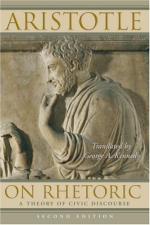
|
| Name: _________________________ | Period: ___________________ |
This test consists of 15 multiple choice questions and 5 short answer questions.
Multiple Choice Questions
1. What did Aristotle think a political orator should be aware of?
(a) Only their country's imports.
(b) Neither their country's imports nor its exports.
(c) Their country's imports and exports.
(d) Only their country's exports.
2. In the beginning of the book, which one of the following did Aristotle indicate about rhetoric?
(a) It was neither an art nor a science.
(b) It was an art and a science.
(c) It was a science.
(d) It was an art.
3. To Aristotle, when did anger take place?
(a) When someone was afraid, had been wronged, or desired revenge.
(b) When someone had been wronged or desired revenge.
(c) When someone was afraid or desired revenge.
(d) When someone was afraid or had been wronged.
4. How did Aristotle explain the binding extent of contracts?
(a) They were not binding.
(b) Only between two individuals or the courts and an individual.
(c) Only between two individuals.
(d) Only between the courts and an individual.
5. Which one of the following was an example of national defense provided in Book I, Chapter 4?
(a) Risks.
(b) Strategy.
(c) Previous battles.
(d) Fortifications.
6. In dealing with just and unjust actions, how did Aristotle indicate the law could be considered?
(a) From the point of view of the victim or the law.
(b) From neither the point of view of the victim nor the law.
(c) From the point of view of only the law.
(d) From the point of view of only the victim.
7. How did Aristotle define "the good"?
(a) That which is sought for its own sake.
(b) That which is sought for another's sake.
(c) That which is sought for the well being of an individual.
(d) That which is sought for the well being of the country.
8. How did Aristotle think the political orator should be able to speak about the good?
(a) Candidly.
(b) Extensively.
(c) Briefly.
(d) Knowledgeably.
9. According to Aristotle, what act should the political rhetorician be concerned with?
(a) The act of limitation.
(b) The act of legislation.
(c) The act of rejection.
(d) The act of ratification.
10. What did Aristotle think was irrelevant to the feeling of indignation?
(a) Anger.
(b) Unearned fortune.
(c) Social status.
(d) Outrage.
11. Besides proof with explicit premises, what was included in Aristotle's definition of syllogism?
(a) A conclusion.
(b) An introduction.
(c) An example.
(d) Multiple examples.
12. What were three examples of the voluntary causes for human action listed by Aristotle?
(a) Reasoning, anger, and appetite.
(b) Reasoning, compulsion, and appetite.
(c) Reasoning, anger, and compulsion.
(d) Anger, compulsion, and appetite.
13. Considering Aristotle's views in Book I, Chapter 2, how would the emotional appeal move an audience?
(a) Through reason, not their feelings.
(b) Through their feelings, not reason.
(c) Through their feelings and reason.
(d) Through neither their feelings or reason.
14. According to Aristotle, what was the most basic cause of pleasure?
(a) Some kind of action in accordance with one's instincts.
(b) Some kind of action in accordance with one's desires.
(c) Some kind of action in accordance with one's nature.
(d) Some kind of action in accordance with one's abilities.
15. As explained by Aristotle, what comprised good?
(a) A few different things.
(b) Many different things.
(c) Only one main thing.
(d) Only two main things.
Short Answer Questions
1. What did Aristotle think was not sought by a person displaying kindness?
2. As discussed by Aristotle, how many modes of persuasion did rhetoric use?
3. Which type(s) of happiness was Aristotle referring to in Book I, Chapter 5?
4. As explained by Aristotle in Book I, Chapter 10, what was the concern of the legal rhetorician?
5. Who did Aristotle think must obey the general law?
|
This section contains 607 words (approx. 3 pages at 300 words per page) |

|




